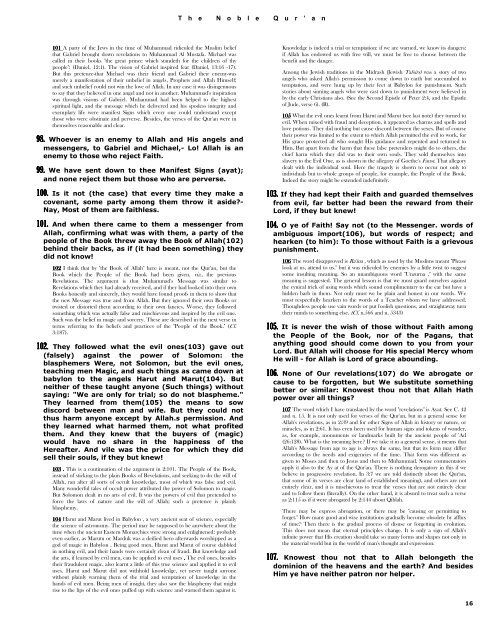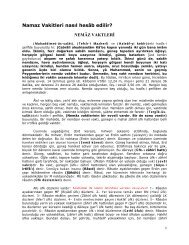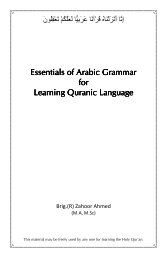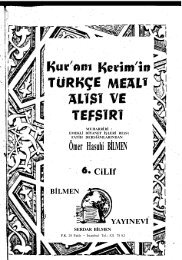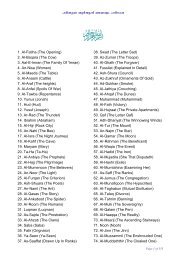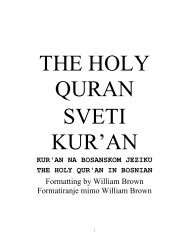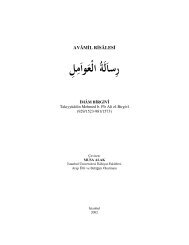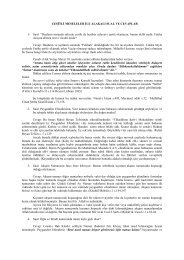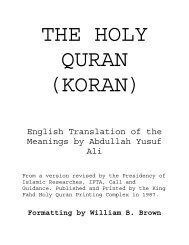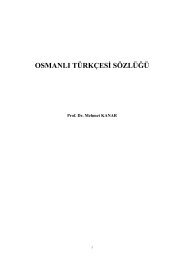English Quran with Commentaries By Yusuf-ali - HolyBooks.com
English Quran with Commentaries By Yusuf-ali - HolyBooks.com
English Quran with Commentaries By Yusuf-ali - HolyBooks.com
- No tags were found...
You also want an ePaper? Increase the reach of your titles
YUMPU automatically turns print PDFs into web optimized ePapers that Google loves.
T h e N o b l e Q u r ’ a n<br />
101 A party of the Jews in the time of Muhammad ridiculed the Muslim belief<br />
that Gabriel brought down revelations to Muhammad Al Mustafa. Michael was<br />
called in their books "the great prince which standeth for the children of thy<br />
people": (Daniel, 12:1). The vision of Gabriel inspired fear (Daniel, 13:16 -17).<br />
But this pretence-that Michael was their friend and Gabriel their enemy-was<br />
merely a manifestation of their unbelief in angels, Prophets and Allah Himself;<br />
and such unbelief could not win the love of Allah. In any case it was disingenuous<br />
to say that they believed in one angel and not in another. Muhammad's inspiration<br />
was through visions of Gabriel. Muhammad had been helped to the highest<br />
spiritual light, and the message which he delivered and his spodess integrity and<br />
exemplary life were manifest Signs which every one could understand except<br />
those who were obstinate and perverse. Besides, the verses of the Qur'an were in<br />
themselves reasonable and clear.<br />
98. Whoever is an enemy to Allah and His angels and<br />
messengers, to Gabriel and Michael,- Lo! Allah is an<br />
enemy to those who reject Faith.<br />
99. We have sent down to thee Manifest Signs (ayat);<br />
and none reject them but those who are perverse.<br />
100. Is it not (the case) that every time they make a<br />
covenant, some party among them throw it aside?-<br />
Nay, Most of them are faithless.<br />
101. And when there came to them a messenger from<br />
Allah, confirming what was <strong>with</strong> them, a party of the<br />
people of the Book threw away the Book of Allah(102)<br />
behind their backs, as if (it had been something) they<br />
did not know!<br />
102 I think that by "the Book of Allah" here is meant, not the Qur'an, but the<br />
Book which the People of the Book had been given, viz., the previous<br />
Revelations. The argument is that Muhammad's Message was similar to<br />
Revelations which they had already received, and if they had looked into their own<br />
Books honestly and sincerely, they would have found proofs in them to show that<br />
the new Message was true and from Allah. But they ignored their own Books or<br />
twisted or distorted them according to their own fancies. Worse, they followed<br />
something which was actually false and mischievous and inspired by the evil one.<br />
Such was the belief in magic and sorcery. These are described in the next verse in<br />
terms referring to the beliefs and practices of the "People of the Book." (Cf.<br />
3:187).<br />
102. They followed what the evil ones(103) gave out<br />
(falsely) against the power of Solomon: the<br />
blasphemers Were, not Solomon, but the evil ones,<br />
teaching men Magic, and such things as came down at<br />
babylon to the angels Harut and Marut(104). But<br />
neither of these taught anyone (Such things) <strong>with</strong>out<br />
saying: "We are only for trial; so do not blaspheme."<br />
They learned from them(105) the means to sow<br />
discord between man and wife. But they could not<br />
thus harm anyone except by Allah.s permission. And<br />
they learned what harmed them, not what profited<br />
them. And they knew that the buyers of (magic)<br />
would have no share in the happiness of the<br />
Hereafter. And vile was the price for which they did<br />
sell their souls, if they but knew!<br />
103 . This is a continuation of the argument in 2:101. The People of the Book,<br />
instead of sticking to the plain Books of Revelations, and seeking to do the will of<br />
Allah, ran after all sorts of occult knowledge, most of which was false and evil.<br />
Many wonderful tales of occult power attributed the power of Solomon to magic.<br />
But Solomon dealt in no arts of evil. It was the powers of evil that pretended to<br />
force the laws of nature and the will of Allah; such a pretence is plainly<br />
blasphemy.<br />
104 Harut and Marut lived in Babylon , a very ancient seat of science, especially<br />
the science of astronomy. The period may be supposed to be anywhere about the<br />
time when the ancient Eastern Monarchies were strong and enlightened: probably<br />
even earlier, as Marutu or Marduk was a deified hero afterwards worshipped as a<br />
god of magic in Babylon . Being good men, Harut and Marut of course dabbled<br />
in nothing evil, and their hands were certainly clean of fraud. But knowledge and<br />
the arts, if learned by evil men, can be applied to evil uses . The evil ones, besides<br />
their fraudulent magic, also learnt a little of this true science and applied it to evil<br />
uses. Harut and Marut did not <strong>with</strong>hold knowledge, yet never taught anyone<br />
<strong>with</strong>out plainly warning them of the trial and temptation of knowledge in the<br />
hands of evil men. Being men of insight, they also saw the blasphemy that might<br />
rise to the lips of the evil ones puffed up <strong>with</strong> science and warned them against it.<br />
Knowledge is indeed a trial or temptation: if we are warned, we know its dangers:<br />
if Allah has endowed us <strong>with</strong> free will, we must be free to choose between the<br />
benefit and the danger.<br />
Among the Jewish traditions in the Midrash (Jewish Tafsirs) was a story of two<br />
angels who asked Allah's permission to <strong>com</strong>e down to earth but succumbed to<br />
temptation, and were hung up by their feet at Babylon for punishment. Such<br />
stories about sinning angels who were cast down to punishment were believed in<br />
by the early Christians also. (See the Second Epistle of Peter 2:4, and the Epistle<br />
of Jude, verse 6). (R).<br />
105 What the evil ones learnt from Harut and Marut (see last note) they turned to<br />
evil. When mixed <strong>with</strong> fraud and deception, it appeared as charms and spells and<br />
love potions. They did nothing but cause discord between the sexes. But of course<br />
their power was limited to the extent to which Allah permitted the evil to work, for<br />
His grace protected all who sought His guidance and repented and returned to<br />
Him. But apart from the harm that these false pretenders might do to others, the<br />
chief harm which they did was to their own souls. They sold themselves into<br />
slavery to the Evil One, as is shown in the allegory of Goethe's Faust. That allegory<br />
dealt <strong>with</strong> the individual soul. Here the tragedy is shown to occur not only to<br />
individuals but to whole groups of people, for example, the People of the Book.<br />
Indeed the story might be extended indefinitely.<br />
103. If they had kept their Faith and guarded themselves<br />
from evil, far better had been the reward from their<br />
Lord, if they but knew!<br />
104. O ye of Faith! Say not (to the Messenger. words of<br />
ambiguous import(106), but words of respect; and<br />
hearken (to him): To those <strong>with</strong>out Faith is a grievous<br />
punishment.<br />
106 The word disapproved is Ra'ina , which as used by the Muslims meant "Please<br />
look at us, attend to us." but it was ridiculed by enemies by a little twist to suggest<br />
some insulting meaning. So an unambiguous word "Unzurna ," <strong>with</strong> the same<br />
meaning is suggested. The general lesson is that we must guard ourselves against<br />
the cynical trick of using words which sound <strong>com</strong>plimentary to the ear but have a<br />
hidden barb in them. Not only must we be plain and honest in our words. We<br />
must respectfully hearken to the words of a Teacher whom we have addressed.<br />
Thoughdess people use vain words or put foolish questions, and straightaway turn<br />
their minds to something else. (Cf. n.566 and n. 5343)<br />
105. It is never the wish of those <strong>with</strong>out Faith among<br />
the People of the Book, nor of the Pagans, that<br />
anything good should <strong>com</strong>e down to you from your<br />
Lord. But Allah will choose for His special Mercy whom<br />
He will - for Allah is Lord of grace abounding.<br />
106. None of Our revelations(107) do We abrogate or<br />
cause to be forgotten, but We substitute something<br />
better or similar: Knowest thou not that Allah Hath<br />
power over all things?<br />
107 The word which I have translated by the word "revelations" is Ayat. See C. 42<br />
and n. 15. It is not only used for verses of the Qur'an, but in a general sense for<br />
Allah's revelations, as in 2:39 and for other Signs of Allah in history or nature, or<br />
miracles, as in 2:61. It has even been used for human signs and tokens of wonder,<br />
as, for example, monuments or landmarks built by the ancient people of 'Ad<br />
(26:128). What is the meaning here? If we take it in a general sense, it means that<br />
Allah's Message from age to age is always the same, but that its form may differ<br />
according to the needs and exigencies of the time. That form was different as<br />
given to Moses and then to Jesus and then to Muhammad. Some <strong>com</strong>mentators<br />
apply it also to the Ay at of the Qur'an. There is nothing derogatory in this if we<br />
believe in progressive revelation. In 3:7 we are told distinctly about the Qur'an,<br />
that some of its verses are clear (and of established meaning), and others are not<br />
entirely clear, and it is mischievous to treat the verses that are not entirely clear<br />
and to follow them (literally). On the other hand, it is absurd to treat such a verse<br />
as 2:115 as if it were abrogated by 2:144 about Qiblah.<br />
There may be express abrogation, or there may be "causing or permitting to<br />
forget." How many good and wise institutions gradually be<strong>com</strong>e obsolete by afflux<br />
of time? Then there is the gradual process of disuse or forgetting in evolution.<br />
This does not mean that eternal principles change. It is only a sign of Allah's<br />
infinite power that His creation should take so many forms and shapes not only in<br />
the material world but in the world of man's thought and expression.<br />
107. Knowest thou not that to Allah belongeth the<br />
dominion of the heavens and the earth? And besides<br />
Him ye have neither patron nor helper.<br />
16


